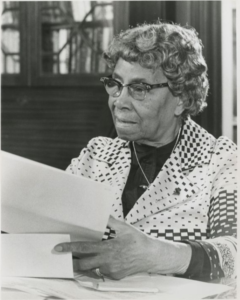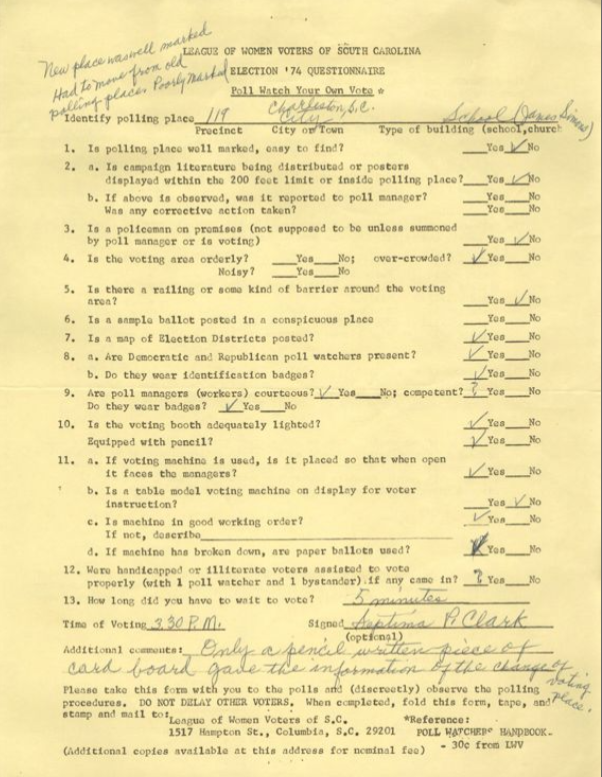» Archive Spotlight: The Legacy of Septima P. Clark by Kangkang Kovacs

Septima P. Clark (1898 – 1987) was a pioneer educator, civil rights activist, and Dr. Martin Luther King, Jr. called her the “Mother of the Movement.” King considered her to be a “community teacher, [an] intuitive fighter for human rights and leader of her unlettered and disillusioned people.”1
Clark was born in Charleston, South Carolina, to a laundress and a formerly enslaved man. In 1916, she graduated from secondary school and began her teaching career at a Black school on Johns Island. For more than thirty years, Clark taught at schools across the state. The education Clark provided to her students went beyond reading and literacy. Social justice and civic duty played an important role in her classrooms.
For example, Clark volunteered for the League of Women Voters of South Carolina and taught about voter registration across the state. The League of Women Voters is a nonpartisan organization founded in 1920 to secure voting rights for women and engage all Americans to voice themselves in democracy. Clark’s contribution went beyond the state of South Carolina as well. Rosa Parks participated in one of Clark’s workshops at the Highlander Folk School in Monteagle, Tennessee, just weeks before she helped launch the Montgomery Bus Boycott. Having committed her entire teaching career in the cause of social justice, Clark described her own position in the Civil Rights Movement by saying that “knowledge could empower marginalized groups in ways that formal legal equality couldn’t.”2

Here is a questionnaire completed by Clark in 1974 when she volunteered as a poll watcher for the League of Women Voters of South Carolina. The questionnaire included information on ones’ polling place and detailed questions about the voting process.
Clark has received several accolades, including an honorary doctorate of humane letters by the College of Charleston in 1978 and President Jimmy Carter awarded her a Living Legacy Award in 1979. In 1987, her second autobiography, Ready from Within: Septima Clark and the Civil Rights Movement, won the American Book Award.
Sources
- Grace Jordan McFadden, “Septima P. Clark and the Struggle for Human Rights,” in Women in the Civil Rights Movement, ed. Vickie L. Crawford et al., 1990. p. 85.
- Tomiko Brown-Nagin (1999) “The transformation of a social movement into law? the SCLC and NAACP’s campaigns for civil rights reconsidered in light of the educational activism of Septima Clark”, Women’s History Review, 8:1, 81-137, DOI: 10.1080/09612029900200193
Image Credits
- “Septima P. Clark” Lowcountry Digital Library, Avery Research Center at the College of Charleston. https://lcdl.library.cofc.edu/lcdl/catalog/lcdl:93135
- “League of Women Voters of South Carolina Election Questionnaire, 1974” Lowcountry Digital Library, Avery Research Center at the College of Charleston, 1974. https://lcdl.library.cofc.edu/lcdl/catalog/lcdl:93480
